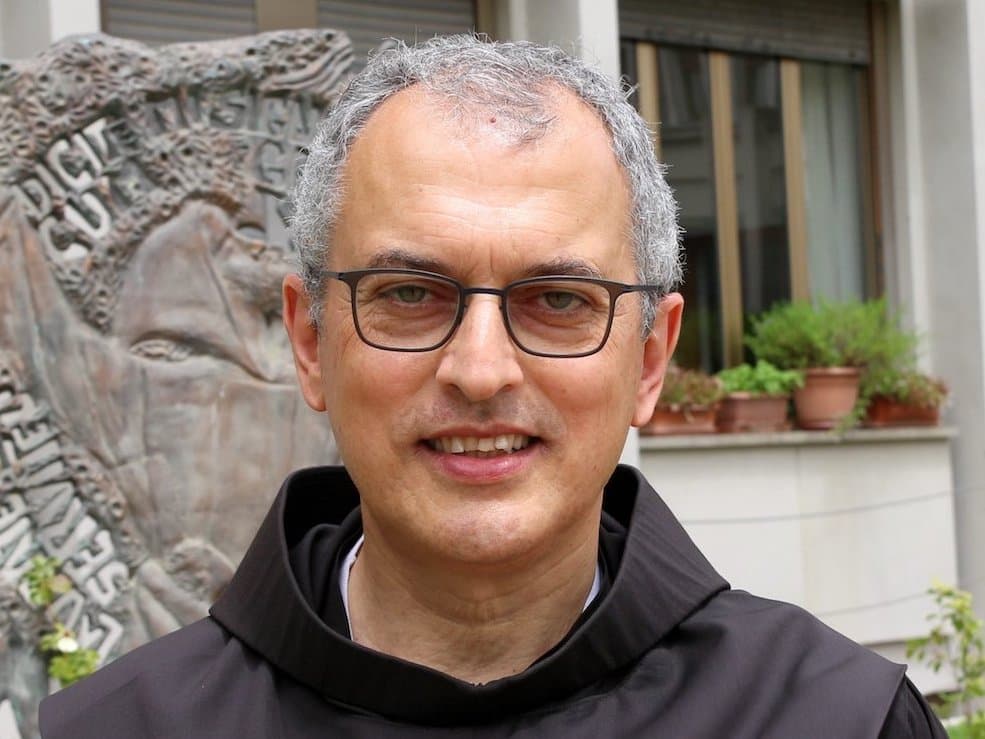ROME – Father Massimo Fusarelli, leader of the worldwide Franciscan order, has appealed to his fellow Franciscans to stay put in the Holy Land despite rising tensions and threats to physical safety due to the ongoing war between Israel and Hamas on the Gaza Strip.
Speaking in an April 18 interview with the Franciscan-run Custodia magazine, Fusarelli said after a recent visit to the region that the members of the Franciscan order living in the Holy Land were “better than I thought,” despite the current circumstances.
He said his first words to friars living in the region were, “Please, brothers, stay here.”
“Many are going away, from both the peoples of this land. Even the Christians are leaving. We are remaining. Of course, we do not have our families or our children here, perhaps it is easier for us. But staying here is a very great sign,” he said.
Fusarelli said choosing to stay despite increased military escalation in the region does not mean being “shut up in our convents,” but rather entails “staying with the people, and then remaining as intercessors.”
The friars, he said, are “hurt by everything that is happening, but also determined to remain here.”
Fusarelli, 63, who has served as Minister General of the Franciscan order since 2021, arrived in Jerusalem April 13, the same day that Iran launched a missile strike on Israel, its first ever direct attack on Israel by Iran. It came in response to an apparent Israeli airstrike that destroyed a building in Iran’s embassy compound in Damascus that killed several Iranian officers.
Israel, which managed to block around 90 percent of Iran’s missiles, said it would retaliate, and carried out a strike on Iran Thursday. Iranian officials so far have played down the significance of the Israeli action, saying it caused no damage or fatalities, and have not signaled immediate plans to respond.
Tensions between Israeli and Iranian proxies throughout the Middle East have intensified in the six months since the war in Gaza erupted following an Oct. 7 Hamas attack on Israel, which prompted an Israeli ground and air offensive to oust Hamas from power and free hostages taken in the attack.
Pope Francis, other top aides, and Christian leaders in the Latin Patriarchate of Jerusalem and the rest of the Holy Land have repeatedly called for a ceasefire in Gaza to end the bloodshed and allow access to much-needed humanitarian aid.
From the beginning, the international community has feared that the Gaza war could morph into a broader regional conflict, and the recent exchange of fire between Israel and Iran has exacerbated those fears.
American Cardinal Timothy Dolan of New York was also in the Holy Land during Iran’s strike on Israel and was forced to seek shelter with his delegation.
Fusarelli in his interview said his visit to the Holy Land had been planned for over a year, before Hamas’s Oct. 7, 2023, attack, and that the idea was originally to send a much larger group, however, due to the current situation, only the vicar general of the Franciscans accompanied him.
He said he made the decision to continue with the trip because, “having considered that the friars, the Christians, live here in danger every day, I thought that I could come for a few days as well.”
“It is important to come to the Holy Land not only once every six years, but more regularly, to accompany this presence. I cannot solve anything, but I can be here, and this is very important,” he said.
Fusarelli stressed the importance of dialogue, saying both sides “must be ready to lose something, each one must be ready to take a step back, and this seems very difficult to me at the present time.”
To this end, he recalled how Saint Francis of Assisi met with the Sultan of Egypt on a bloody battlefield in 1219, in a bid to urge dialogue and bring peace at the height of the Crusades.
“Francis was willing to find in this man a positive word and the Sultan was also open to Francis: this allowed their encounter,” Fusarelli said, noting that the battle continued, so nothing was solved immediately, but the ability of both men to meet and take a step back “was so decisive that we are still talking about it today.”
If Saint Francis were on the battlefield today, he said, “he would try to help everyone take a step back and look at the good of these peoples and this land.”
Noting that this year marks the 800th of Saint Francis receiving the stigmata, the wounds of Jesus Christ, on his own body, Fusarelli said this holds significance given the wounds currently being inflicted on the Holy Land.
“Francis received the wounds of the Lord and like Jesus, remained wounded. Jesus always carried in himself the marks of the Passion, the Resurrection did not cancel the wounds,” he said, noting that for Saint Francis, the stigmata was a sign that “the wounds of our human condition remain.”
Christians must learn to live “in a reality full of stigmata, of wounds and through the new eyes of the faith,” Fusarelli said, saying he sees this new faith in the love his fellow friars show to the people of the Holy Land by “staying there, close to these people and loving them.”
“People understand this language straight away,” he said, saying there is also a need to “denounce” and offer words of peace “for those who cannot speak and without a voice because nobody listens to them,” including the poor.
Only then, he said, can they begin “to do works of peace, concrete signs of peace inside and through the wounds.”
Follow Elise Ann Allen on X: @eliseannallen















